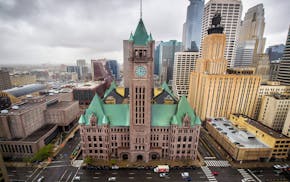There's something particularly detestable about political assassinations in America. They're anti-democratic.
Thankfully, the nation is not mourning the murder of a member of Congress this weekend. The shooter Wednesday morning at a baseball field in Alexandria, Va., did not kill U.S. Rep. Steve Scalise — though he came close — or any of the other Republicans practicing for the annual congressional charity baseball game.
But James Thomas Hodgkinson's attempt to assassinate duly elected members of Congress was near enough to the real thing to trigger the sequence of emotions that we Americans of a certain age remember too well.
Shock comes first, followed by sadness and sympathy for the injured and killed and their survivors. Sorrow is laced with worry that America is afflicted with a sickness that it is helpless to cure.
Then comes anger. Anger that a lone person with a gun had the hubris and gall to think he knew better than the voters. That he believed he had the right to deprive his fellow citizens of the representation they chose in an election. That his vote, delivered with a bullet, deserved to count above all others.
Those were some of the emotions I felt as a 15-year-old on a high school band trip on June 5, 1968. We were performing a program of patriotic tunes at a shopping mall for an audience smaller than it might have been, had news not reached the nation a few hours before that Sen. Robert Kennedy had been shot in Los Angeles shortly after winning the California presidential primary. He died early the next day.
Tears streamed down my cheeks as I played "America the Beautiful" on my flute that morning. I noticed several girls in the clarinet section crying, too. I had a sense that our band director was avoiding eye contact with us, lest he break down.
How dare a gunman think he had the right to silence Kennedy's powerful voice, just as he was positioned to take his fight against the Vietnam War into the Democratic national convention?
In my youth, assassins denied Americans the chance to give President John Kennedy a second term, to elect Robert Kennedy president, to hear and respond more fully to the prophetic voice of Martin Luther King Jr., to respond to the 1972 presidential bid of segregationist George Wallace. We'll never know how Americans would have acted on those chances. Bullets took control of the nation's destiny out of the people's hands.
That's the direct blow democracy sustains when an assassin strikes. Looking back nearly 50 years makes me aware of secondary ill effects, too. A cynicism about politics and government settled into baby boomer psyches in about 1968 that lingers to this day. Assassins showed a generation how fragile and unreliable democracy can be. It dampened the ambition of some to run for elective office themselves.
Those attitudes have infected subsequent generations, who are seeing for themselves how violence jars democracy.
Last week's shooting hijacked the nation's focus at a time when Congress and the president are taking the nation in new and potentially undesirable directions. When elected officials are the targets of bloody mayhem, public attention turns away from a Senate health care bill that's being crafted in secret or a foreign-policy shift that's alarming America's closest allies. Accountability suffers when the nation is distracted.
Predictably, the congressional baseball shooting brought the nation's long-standing divide over gun policy to the fore. If past is prologue, this round of the gun debate will serve only to reinforce those divisions. Years of mass shootings followed by ferocious but fruitless gun-control fights have left people on both sides of the question convinced that their fellow Americans are dangerously wrongheaded.
Politically motivated violence erodes Americans' trust in their fellow citizens. It heightens suspicion that political rivals are genuine enemies, willing to inflict harm to get their way. Instead of toning down the rhetoric that can inspire a deranged soul to pick up a gun, violence can turn up the volume, creating a vicious cycle.
Now would be a good time to turn off talk radio and partisan cable TV, and ponder what citizens can do to break the cycle.
That's what folks in Arizona did six years ago after U.S. Rep. Gabrielle Giffords was shot at a "Congress on Your Corner" event in Tucson. The National Institute for Civil Discourse at the University of Arizona is the result. It has trained legislators from around the country — including five from Minnesota, one Republican and four DFLers — in the seemingly lost art of respectful political disagreement, in the hope that those legislators will in turn train and inspire their peers to follow suit.
I asked Rep. Connie Bernardy, DFL-Fridley, one of the institute's trained facilitators: Have the workshops your organization led toned down partisan strife at the Minnesota Legislature?
She paused for a long moment before she replied.
"No," she said. "But you can't give up hope. We need people to trust their government, and that has to start with us trusting each other. You've got to start somewhere."
That's a democracy-enhancing response to a democracy-diminishing crime. And that's the kind of hope worth lifting up when violence tries to tear America down.
Lori Sturdevant is a Star Tribune editorial writer and columnist. She is at lsturdevant@startribune.com.

As a topic among policymakers, housing is hotter than it once was
Worries about the U faded in search for new president

Up next for the DFL: amending the state Constitution
To combat contempt of courts, there's no substitute for character


